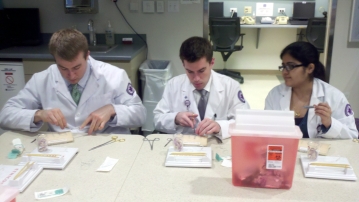Neurosurgery Interest Group Offers Students Glimpse
Into Career as a Neurosurgeon
 |
| At a recent Neurosurgery Interest Group event, first-year medical students Justin Vranic, Addason McCasslin, and Mitali Parmar participated in a suturing exercise. |
The Neurosurgery Interest Group at Northwestern University Feinberg School of Medicine provides first- through fourth-year students numerous opportunities to learn more about the field through presentations, demonstrations, and networking events.
As president of the group’s board of directors, Jack Dougherty, a first-year medical student, acts as the primary interface between the Department of Neurological Surgery and the student body. His team includes fellow first-years Stephanie Ha, vice president, Justin Vranic, education chair, and Ali Habib, treasurer.
“Along with the other board members, my role is to assess the interests and needs of my peers, then work with neurosurgeons here at Northwestern to organize events that students find useful and fun,” says Dougherty.
By attending Neurosurgery Interest Group-hosted events, students gain early access to clinicians from Northwestern Memorial Hospital (NMH), which ranked No. 13 in neurology and neurosurgery in 2010 by U.S.News & World Report.
Each month, experts give talks on a range of topics, from vascular neurosurgery and functional neurology to research opportunities and gamma knife procedures. At most discussions, neurosurgery faculty, fellows, and residents review a clinical case study and offer advice to students about their career paths.
Arif Jivan, a second-year medical student, supplements his required curriculum by attending these presentations. While his future focus remains undefined, Jivan says he appreciates the multidisciplinary nature of neurosurgery.
“Neurosurgery joins with other fields like molecular medicine, translational research, and biotechnology to advance surgical and clinical care for patients,” says Jivan.
The group also collaborates with the Department of Surgery’s Northwestern Center for Advanced Surgical Education (N-CASE) to introduce students to a practical skill required by surgeons: suturing.
“Our suture clinic has been well received by first-year students who enjoy practicing these skills early in their medical school career,” says Dougherty.
Networking dinners with Northwestern experts also allow members to become acquainted with some of the most highly regarded neurosurgeons in the country. David Weinberg, a second-year medical student and past club president, attends these dinners to ask more in-depth questions concerning his future ambitions.
“I hope to pursue neurosurgery because of the intellectual stimulation of the field,” Weinberg says. “I also like the idea of improving the quality of life for patients afflicted with any number of debilitating conditions. Asking questions of neurosurgeons who have been through these experiences has certainly helped to reaffirm my interest.”
Students like Weinberg who show great interest in the specialty are able to gain further hands-on experience by shadowing Northwestern neurosurgeons.
“Students attend clinics, talk with real patients, and observe surgeries in the operating room,” says Dougherty, who facilitates the shadowing program. “Our faculty is excited to participate and they serve as excellent mentors to students who are passionate about neurosurgery.”






